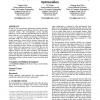Free Online Productivity Tools
i2Speak
i2Symbol
i2OCR
iTex2Img
iWeb2Print
iWeb2Shot
i2Type
iPdf2Split
iPdf2Merge
i2Bopomofo
i2Arabic
i2Style
i2Image
i2PDF
iLatex2Rtf
Sci2ools
105
click to vote
GECCO
2008
Springer
2008
Springer
Dual-population genetic algorithm for nonstationary optimization
In order to solve nonstationary optimization problems efficiently, evolutionary algorithms need sufficient diversity to adapt to environmental changes. The dual-population genetic algorithm (DPGA) is a novel evolutionary algorithm that uses an extra population called the reserve population to provide additional diversity to the main population through crossbreeding. Preliminary experimental results on various periods and degrees of environmental change have shown that the distance between the two populations of DPGA is one of the most important factors that affect its performance. However, it is very difficult to determine the best population distance without prior knowledge about the given problem. This paper proposes a new DPGA that uses two reserve populations (DPGA2). The reserve populations are at different distances from the main population. The information inflow from the reserve populations is controlled by survival selection. Experimental results show that DPGA2 shows a bette...
Evolutionary Algorithms | GECCO 2008 | Nonstationary Optimization Problems | Optimization | Reserve Populations |
Related Content
| Added | 09 Nov 2010 |
| Updated | 09 Nov 2010 |
| Type | Conference |
| Year | 2008 |
| Where | GECCO |
| Authors | Taejin Park, Ri Choe, Kwang Ryel Ryu |
Comments (0)

